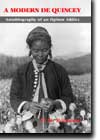| Our Publications | ||
| Books by Title | ||
| Books by Author | ||
| Books by Country | ||
| E-books | ||
| About | ||
| Orchid Press E-books | ||
| Distributed E-books | ||
| Our Bookshop | ||
| About Us | ||
| Browse Shop | ||
| How to Buy | ||
| Contact Us | ||
| WE BUY BOOKS AND LIBRARIES | ||
|
||
Book Reviews

A Modern de Quincey:
Autobiography of an Opium Addict
byH. R. Robinson
2nd edition 2004. 152 pp., 5 b & w plates, 1 map, 215 x 152, Softcover
ISBN-10: 974-524-038-9 $23.00
ISBN-13: 978-974-524-038-4
Downhill To Mandalay
Book review by David McKie,
(The Guardian, Thursday, 6 May 2004)
Just before Christmas a piece appeared in the Guardian discussing cases where people had dreamed that they had uncovered the secret of the universe, only to waken next morning and find they could not remember it. One classic instance, reported by the psychologist William James, was that of a man who repeatedly had this dream and finally managed to write the formula down before he went back to sleep. Next morning he found he had written: “A smell of petroleum prevails throughout.” Another involved an opium addict who jotted the secret down, only to read when he came to full consciousness: “The banana is great, but the skin is greater.”
The evidence about the banana came to light in a piece by George Orwell, republished in Orwell: The Observer Years (The Observer/ Atlantic Books £12). Orwell was reviewing a book by a man called Herbert Robinson whom he had known during his Burmese days: an Indian army officer seconded to the Burma military police who, made redundant, moved to Mandalay and took up smoking opium, at first for a few hours each evening, and later almost full-time.
His attempts to break his addiction included a spell as a Buddhist monk. But the opium lured him back. Later he tried to shoot himself, but botched it, and was left totally blind. His book first appeared in 1942. It has long been out of print, and when Gerry Abbott, a teacher and writer who once lived in Mandalay and is now an honorary fellow of Manchester University, tracked down a copy he was quoted a price of £900. It has now been republished by the Orchid Press, Bangkok, with an introduction by Abbott, and should be available here next month.
As Orwell says in his Observer review, it is amateurishly written. There are times as Robinson describes his early days as officer-cum-administrator-cum-magistrate when you start to fear that the words, “As I well remember telling my punka-wallah”, may be lurking just over the page. Yet some of the scenes from these days are powerful and vivid, as when he comes to his night of passion with a woman he was in the process of trying for murder. They didn’t even remove her handcuffs (and at some point she freely confessed she was guilty as charged).
There is something almost dreamlike in the way he came upon opium, detaching himself from two friends, “the Poet” (who Abbott thinks may have been Orwell) and “the Padre”, with whom he’d gone out for the evening, and then stumbling into an opium den. He evokes the lure of the drug, the mood it creates, the way it took over his life, and the terrible dread when he feared being left without it. The depths of that dread explain Robinson’s decision to kill himself as soon as the police arrived at his door: “I was not going to prison. Too many times during the past I had heard the howls of imprisoned men deprived of their opium… No, there was only one way of escape.”
“It is interesting,” Orwell comments, “to know what the mind can still contain in the face of apparently certain death; interesting that a man can be ready to blow his brains out but anxious to avoid a disfiguring wound.” There’s a further infuriation here: the fact that we know so little about the apparently orthodox young man who first came to Burma: about, for instance, his family, whom he once revisits but about whom he says almost nothing; about his education, in and out of school; about the preoccupations of his formative years. All that is left to a brief episodic foreword.
The shock of his bungled shooting and of his blindness broke the hold of the opium. Phil Baker, whose reference to Robinson’s book in the Guardian first caught Gerry Abbott’s attention, discovered that the captain became a physiotherapist in south London and worked there till his retirement in the 1960s. He died by suicide in March 1965.
At the end of the book there’s a picture of Robinson taken in 1942. It’s presumably the same photograph which Orwell says shows him apparently well-adjusted and happy in spite of his blindness. To me the picture suggests rather more resignedness, even submissiveness.
Robinson himself writes in a preface: “I have been down in the mud, but my experiences there have not been without value. There are, stored away in my heart, one or two memories the fragrance of which is ever with me, and if only for those I would not have had it otherwise.”
[Read a review from The Fortean Times] [Read a review of from The Nation] [Read a review from The South China Morning Post] [More Orchid Press Reviews]
PO Box 70, Trinity TB, NL, A0C 2S0, Canada
Telephone: +1 709-330-4703